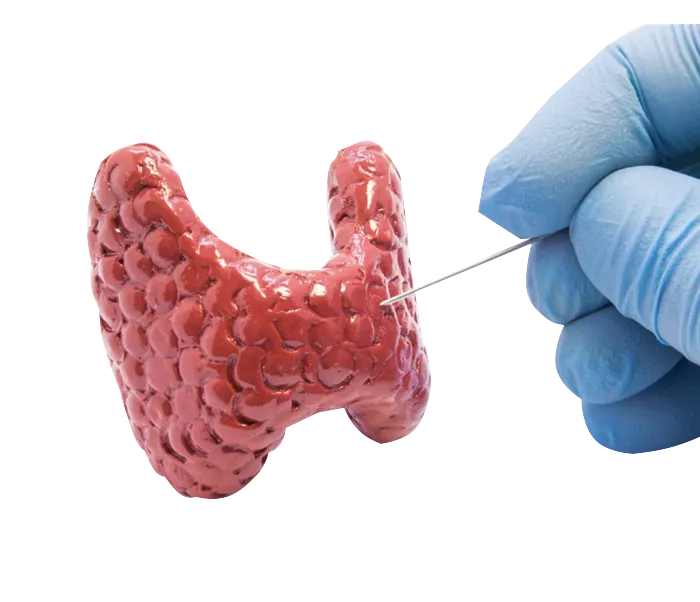Endocrine system surgeries are among the most complex and specialized surgeries in the medical field, aimed at treating various diseases and disorders related to the endocrine glands. These surgeries use advanced methods and techniques to address issues such as thyroid problems, adrenal glands, parathyroid disorders, and other gland-related diseases. Given the impact of these conditions on hormone function and overall body health, endocrine surgeries are of significant importance.
As a pioneer in medical tourism services, cckaam provides a complete treatment process for both domestic and international patients, from initial consultations to post-operative follow-ups. This article discusses the advantages of endocrine surgeries in Iran and the unique services offered by
Fast and Timely Treatment Process in Iran
In Iran, endocrine surgeries are performed with high speed and precision. These surgeries are designed to ensure that patients receive treatment as quickly as possible and achieve the best results. Additionally, the recovery period is very short, allowing patients to return to their daily activities quickly.
General Information About Endocrine System Surgery
- Type of Treatment: Endocrine system surgeries using advanced techniques
- Anesthesia: Local anesthesia or general anesthesia (depending on the patient’s needs)
- Surgery Duration: 1 to 3 hours (depending on the type of surgery)
- Recovery: Typically 1 to 2 days
- Success Rate: Over 90% in most cases
- Effects: Improvement of hormonal function, reduction of disease symptoms, and prevention of future issuesAdvantages of Endocrine System Surgery Treatment in Iran with Special cckaam Services
- Experienced and Specialized Doctors Iranian surgeons, trained at reputable international centers, use advanced methods to treat endocrine gland disorders and are known for their high precision in surgery.
- Advanced Medical Equipment and Technologies Iran performs endocrine surgeries with high accuracy and successful outcomes, thanks to the use of modern equipment and technologies.
- Cost-Effective Treatment costs in Iran are significantly lower than in many other countries, without compromising on the quality of care.
- Comprehensive Medical Travel Services by cckaam cckaam manages every aspect of the medical journey for patients, including obtaining medical visas, hotel bookings, airport transfers, and providing interpreters to facilitate communication with doctors.
- 24/7 Ongoing Support cckaam provides 24/7 support for patients, ensuring they can stay in touch with the medical team through video calls or WhatsApp.
Conclusion
Endocrine system surgeries are crucial treatments for hormonal and glandular problems that can significantly improve patients’ quality of life. Iran, with its prominent surgeons and advanced equipment, is one of the ideal destinations for these surgeries. cckaam, with its exceptional services, helps patients have a comfortable and effective treatment experience for their endocrine system disorders. If you are looking for an effective and affordable way to treat your glandular issues, contact us to begin your medical journey.
Complete and Professional Article on Endocrine System Disorders and Related Surgeries
Introduction
The endocrine system is one of the vital systems in the human body, responsible for regulating and controlling various bodily functions through hormone secretion. This system includes several glands such as the thyroid, parathyroid, pituitary, adrenal glands, pancreas, and gonads. Any disorder or disease affecting these glands can lead to serious health problems. Endocrine system diseases may include hormonal disorders, thyroid gland diseases, hyperparathyroidism, acromegaly, type 1 and type 2 diabetes, pituitary gland disorders, and more.In this article, we will explore medical treatments and surgeries related to endocrine system diseases and discuss the importance of surgery in this field.
Common Endocrine System Diseases
- Thyroid Diseases
- Goiter: This disease causes the thyroid gland to enlarge, often due to iodine deficiency in the diet.
- Hypothyroidism: A deficiency of thyroid hormone that can lead to reduced metabolism, fatigue, weight gain, and heart problems.
- Hyperthyroidism: An abnormal increase in thyroid hormone, which can cause rapid heart rate, weight loss, and increased metabolism.
- Thyroid Cancer: A rare form of cancer that often requires surgery for treatment.
- Acromegaly: This disease results from excessive secretion of growth hormone from the pituitary gland, leading to abnormal growth of bones and soft tissues. Surgery is considered the primary treatment for this condition.
- Hyperparathyroidism: In this disease, the parathyroid gland abnormally secretes parathyroid hormone, which can lead to imbalances in blood calcium levels and bone problems. Surgery to remove the parathyroid gland is a treatment option.
- Diabetes: Type 1 and Type 2 diabetes, especially Type 1, where the pancreas is unable to produce insulin, often require medication and sometimes pancreatic transplants for treatment.
Non-Surgical Treatments for Endocrine Disorders
- Medication: Many endocrine system diseases are treated with medications. For example, hypothyroidism is treated with thyroid hormone replacement medications, while hyperthyroidism may be treated with anti-thyroid medications or radioactive iodine.
- Hormonal Care: For conditions like acromegaly and diabetes, medications that regulate hormone levels can help control the disease.
Surgical Treatments for Endocrine Disorders
In some cases, medication alone cannot fully treat endocrine system diseases, and surgery becomes a primary treatment option.- Thyroid Surgery
- Thyroid Cancer Treatment: Thyroid cancer is a dangerous endocrine disease that usually requires surgery. In this procedure, the cancerous parts of the thyroid gland are removed.
- Goiter: In cases where goiter causes breathing or swallowing problems, surgery to remove part or all of the thyroid gland may be necessary.
- Parathyroid Surgery
- Primary Hyperparathyroidism: In this condition, surgery to remove one or more parathyroid glands is necessary to control blood calcium levels.
- Pituitary Surgery
- Acromegaly: This condition usually results from a tumor in the pituitary gland, leading to excessive growth hormone secretion. Surgery to remove the pituitary tumor is the primary treatment.
- Pituitary Tumors: In cases where non-cancerous tumors form in the pituitary gland, surgery to remove these tumors is necessary.
- Adrenal Surgery
- Adrenal Tumors: Surgery to remove adrenal gland tumors that abnormally produce hormones is typically considered the primary treatment.
- Pancreatic Surgery
- Type 1 Diabetes: In cases where the pancreas cannot naturally produce insulin, a pancreatic transplant is one surgical treatment option.
Benefits of Surgery in Treating Endocrine System Diseases
- Fast and Effective Results: Surgery often leads to quick and effective outcomes, especially in treating thyroid cancer or pituitary gland diseases. It can cure the disease entirely in many cases.
- Improved Quality of Life: Many patients experience significant improvements in their quality of life after endocrine system surgeries. Surgery can reduce unpleasant symptoms like goiter, abnormal growth of body parts, and hormonal changes.
- Prevention of Future Complications: Surgery can prevent serious complications such as bone fractures, heart diseases, and high blood pressure.
Conclusion
Treating endocrine system diseases is one of the most complex medical challenges, requiring precise diagnosis and specialized treatments. Surgery, as one of the main treatment methods, can effectively treat many endocrine disorders. Moreover, with scientific and technological advancements, surgical facilities offering high precision and reduced risks have significantly improved. Reputable hospitals and medical centers in Iran, with specialized doctors and advanced equipment, provide high-quality services for both domestic and international patients.For those seeking treatment for endocrine diseases, choosing reputable hospitals with expert medical teams is a crucial step in improving health and quality of life.
The Role of Nutrition in the Treatment of Endocrine System Diseases
Introduction
Healthy and proper nutrition is one of the key pillars of maintaining overall body health. The endocrine system, which is responsible for regulating and secreting hormones in the body, is among the systems that are directly influenced by nutrition. Endocrine glands such as the thyroid, parathyroid, pituitary, adrenal glands, pancreas, and gonads play a vital role in regulating various bodily processes. Therefore, proper nutrition can play a significant role in the prevention, management, and treatment of many diseases related to this system.This article will examine the role of nutrition in the treatment and control of endocrine system diseases and explore the impact of different foods on the health of these systems.
- Nutrition and Thyroid Diseases
The thyroid gland is one of the most important endocrine glands, responsible for producing thyroid hormones. These hormones regulate metabolism, body temperature, and cellular growth and development.
Hypothyroidism (Underactive Thyroid)
In this condition, the thyroid gland is unable to produce sufficient thyroid hormone, leading to a decrease in metabolism. Nutrition can play a key role in managing this disease.- Iodine Intake: Iodine is an essential mineral for thyroid hormone production. Iodine deficiency can lead to thyroid problems such as goiter. Consuming iodine-rich foods like fish, seafood, iodized salt, and seaweed can be beneficial.
- Selenium: This mineral supports the proper functioning of the thyroid gland and acts as an antioxidant, protecting thyroid cells from damage. Rich sources of selenium include nuts, seeds, and fish.
- Antioxidants: Fresh fruits and vegetables contain antioxidants that can help reduce inflammation and support thyroid health.
Hyperthyroidism (Overactive Thyroid)
In this condition, the thyroid gland produces excessive thyroid hormones, leading to an increase in metabolism. The treatment for this disease typically includes medications and sometimes surgery, but nutrition also plays a supportive role.- Limiting Iodine Intake: In some cases, excessive iodine consumption can worsen hyperthyroidism. Therefore, reducing the intake of iodine-rich foods like fish and seafood is recommended.
- Potassium and Magnesium: Consuming foods rich in potassium and magnesium can help balance electrolytes in the body, as hyperthyroidism may lead to a deficiency of these minerals. Sources rich in potassium and magnesium include bananas, avocados, leafy greens, and nuts.
- Nutrition and Diabetes
Diabetes is a common disease of the endocrine system, primarily related to a deficiency in the production or function of the hormone insulin in the body. Proper nutrition can play a vital role in controlling blood sugar levels and preventing complications related to diabetes.
Type 1 Diabetes
This form of diabetes typically occurs in children and adolescents, where the body loses the ability to produce insulin.- Balanced Diet: In type 1 diabetes, consuming complex carbohydrates (such as whole grains, vegetables, and legumes) instead of simple carbohydrates (like sugar and sweets) can help maintain better blood sugar control.
- Proteins and Healthy Fats: Consuming low-fat proteins (such as lean meats, fish, and eggs) and unsaturated fats (such as olive oil and avocados) can aid in regulating blood sugar levels.
Type 2 Diabetes
This form of diabetes typically occurs in adults, where the body becomes resistant to insulin. Proper nutrition can help control weight, reduce insulin resistance, and prevent disease progression.- Reducing Sugar and Simple Carbohydrates: For diabetic patients, controlling sugar intake and processed foods is essential. Foods with a low glycemic index, such as vegetables, fresh fruits, and whole grains, can assist in blood sugar control.
- Fiber: Consuming fiber through fruits, vegetables, and whole grains can help reduce sugar absorption from the intestines and stabilize blood sugar levels.
- Nutrition and Adrenal Diseases
The adrenal glands produce steroid hormones such as cortisol, aldosterone, and adrenaline, which play key roles in regulating stress, blood pressure, and metabolism.
Addison’s Disease
This condition is caused by insufficient production of adrenal hormones, leading to weakness, fatigue, and low blood pressure.- Salt: Increasing salt intake can benefit patients with Addison’s disease, as they may experience low blood pressure due to aldosterone deficiency.
- Proteins and Healthy Fats: It is important for patients with Addison’s disease to consume proteins and healthy fats to provide energy.
Cushing’s Syndrome
This condition results from excessive production of cortisol, leading to obesity, high blood pressure, and muscle weakness.- Reducing Sugar and Saturated Fats: Reducing sugar and unhealthy fats can help control weight and blood pressure in patients with Cushing’s syndrome.
- General Nutritional Tips for Endocrine System Disease Patients
- Variety in Nutrition: Consuming a variety of fruits, vegetables, proteins, whole grains, and healthy fats can help maintain hormonal balance in the body.
- Water and Hydration: Adequate water intake is essential for maintaining hydration balance in the body. This is especially important in thyroid and adrenal diseases.
- Limiting Alcohol and Caffeine: Excessive consumption of alcohol and caffeine can negatively impact endocrine function, so limiting these substances is beneficial.
Conclusion
Nutrition plays a crucial role in the management and treatment of endocrine system diseases. From iodine and selenium to improve thyroid function to fiber and other nutrients to control diabetes and adrenal diseases, proper nutrition can help reduce symptoms and prevent complications. Paying attention to a balanced and healthy diet, along with medical treatments, can contribute to the improvement of the endocrine system’s health and enhance the quality of life for patients.









